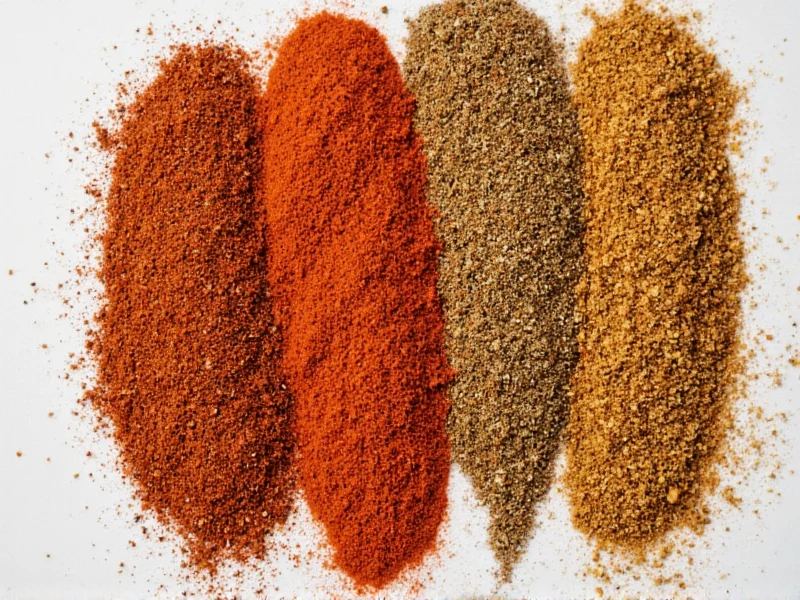Understanding what's in Cajun seasoning is essential for anyone looking to authentically recreate the bold flavors of Louisiana cuisine. This versatile spice blend forms the foundation of countless Southern dishes, from jambalaya to blackened fish. Unlike many commercial spice mixes, traditional Cajun seasoning relies on a specific combination of dried herbs and peppers that work together to create its signature heat and complexity.
The Essential Components of Authentic Cajun Seasoning
While recipes vary among families and regions of Louisiana, authentic Cajun seasoning maintains a consistent core of ingredients that distinguish it from similar blends like Creole seasoning. The magic happens through the careful balance of heat, earthiness, and aromatic elements.
Primary Spices in Cajun Seasoning
Every genuine Cajun spice blend includes these fundamental components:
| Ingredient | Flavor Contribution | Typical Proportion |
|---|---|---|
| Paprika | Earthy base, mild sweetness, vibrant color | 25-30% |
| Cayenne Pepper | Primary heat source, sharp spiciness | 15-20% |
| Garlic Powder | Savory depth, pungent aroma | 10-15% |
| Onion Powder | Sweetness, aromatic foundation | 10-15% |
| Black Pepper | Sharp heat, woody notes | 8-12% |
| White Pepper | Distinctive heat, earthy undertones | 5-8% |
| Dried Oregano | Herbal, slightly bitter complexity | 5-7% |
| Dried Thyme | Floral notes, earthy aroma | 5-7% |
What Makes Cajun Seasoning Unique
The distinctive character of Cajun seasoning comes from its specific ingredient ratios and the absence of certain elements found in similar blends. Unlike Creole seasoning, which typically includes tomatoes and more herbs, traditional Cajun seasoning focuses on heat and earthiness with minimal sweetness.
One key differentiator is the dual pepper approach—using both black and white pepper alongside cayenne. White pepper contributes a different type of heat that's less sharp but more pervasive than black pepper alone. This combination creates the layered spiciness that defines authentic Cajun cooking.
Variations in Cajun Seasoning Recipes
While the core ingredients remain consistent, several variations exist based on family traditions and regional preferences across Louisiana:
- Salt content: Traditional Cajun seasoning often contains salt, but many modern recipes and commercial blends offer salt-free versions for dietary considerations
- Additional spices: Some recipes incorporate cumin for earthiness or mustard powder for complexity
- Heat level adjustments: Proportions of cayenne vary significantly—from mild blends using just 5% to extremely hot versions with up to 30% cayenne
- Regional differences: Southwestern Louisiana blends tend to be hotter, while those from the Acadiana region often emphasize herbal notes
Cajun vs. Creole Seasoning: Understanding the Difference
Many people confuse Cajun and Creole seasonings, but they have distinct ingredient profiles and culinary applications. The primary differences include:
- Cajun seasoning relies more heavily on peppers for heat, while Creole seasoning emphasizes herbs
- Traditional Creole seasoning includes additional herbs like parsley and basil
- Cajun blends typically contain little to no salt in authentic preparations, while Creole seasoning often has higher salt content
- Cajun cooking developed in rural areas with available spices, while Creole seasoning evolved in New Orleans with greater access to diverse ingredients
Creating Your Own Homemade Cajun Seasoning
Making your own Cajun seasoning allows for customization based on personal taste preferences and dietary needs. The basic ratio for a versatile homemade blend is:
- ¼ cup paprika
- 2 tablespoons cayenne pepper
- 2 tablespoons garlic powder
- 2 tablespoons onion powder
- 1½ tablespoons black pepper
- 1 tablespoon white pepper
- 1 tablespoon dried oregano
- 1 tablespoon dried thyme
- Optional: 2 tablespoons sea salt
Mix all ingredients thoroughly in a bowl, then store in an airtight container. For optimal flavor, let the blend rest for 24-48 hours before use to allow the flavors to meld. This homemade cajun seasoning recipe creates a balanced blend that works well for most applications while allowing for personal adjustments.
Using Cajun Seasoning Effectively in Cooking
To get the most from your Cajun seasoning, consider these professional cooking techniques:
- Dry rub application: For meats, apply generously and let sit for at least 30 minutes before cooking to allow flavors to penetrate
- Oil infusion: Mix with olive oil to create a paste that adheres better to proteins and vegetables
- Layering flavors: Add during multiple cooking stages—some at the beginning for depth, some at the end for brightness
- Temperature considerations: High heat can burn delicate spices, so add toward the end when sautéing or use in finishing applications
Storage and Shelf Life of Cajun Seasoning
Proper storage maintains the potency and flavor of your Cajun seasoning blend. Whole spices retain freshness longer than pre-ground versions, but even ground spices can maintain quality with proper care.
Store your cajun seasoning in an airtight container away from heat, light, and moisture. A dark cupboard works better than refrigerator storage, which can introduce moisture. Properly stored, homemade cajun seasoning maintains peak flavor for 6-8 months, though it remains safe indefinitely. The spices gradually lose potency over time, so check for vibrant color and strong aroma to determine freshness.
Adapting Cajun Seasoning for Dietary Needs
Modern interpretations of traditional Cajun seasoning accommodate various dietary requirements without sacrificing authentic flavor:
- Salt-free versions: Omit salt entirely or use potassium chloride substitutes for sodium-restricted diets
- Allium-free options: For those avoiding garlic and onion, increase paprika and add asafoetida for similar savory notes
- Low-heat adaptations: Reduce cayenne significantly while increasing paprika and white pepper for flavor without intense heat
- Organic and non-GMO: Source certified organic individual spices for a premium blend











 浙公网安备
33010002000092号
浙公网安备
33010002000092号 浙B2-20120091-4
浙B2-20120091-4